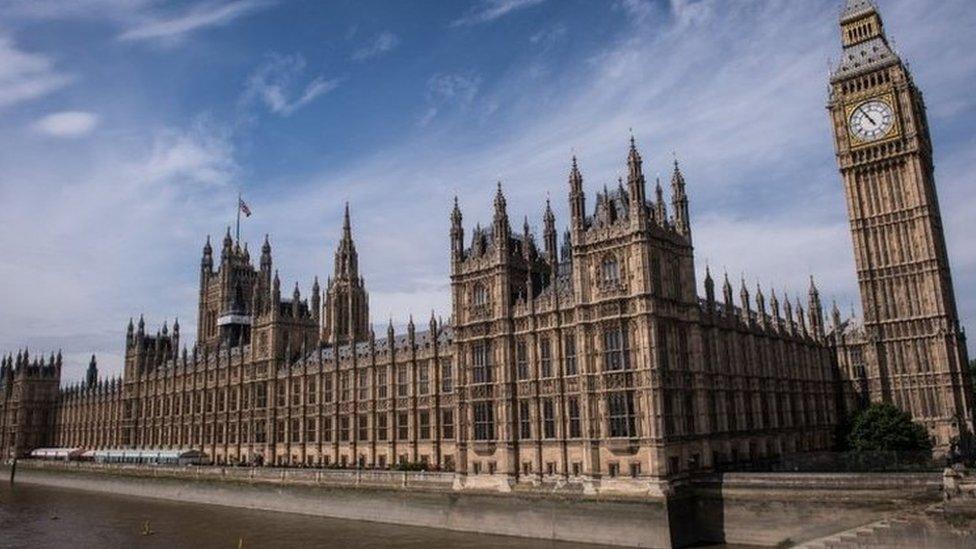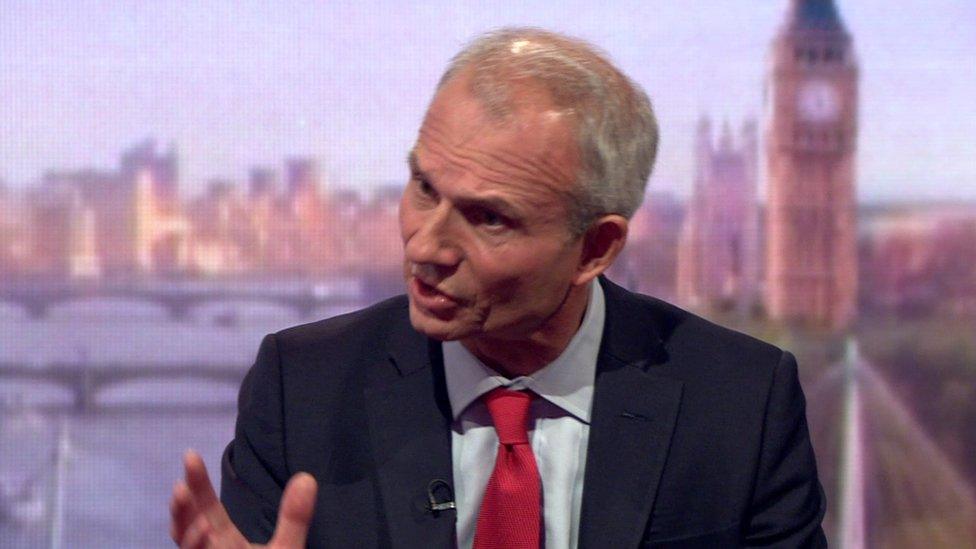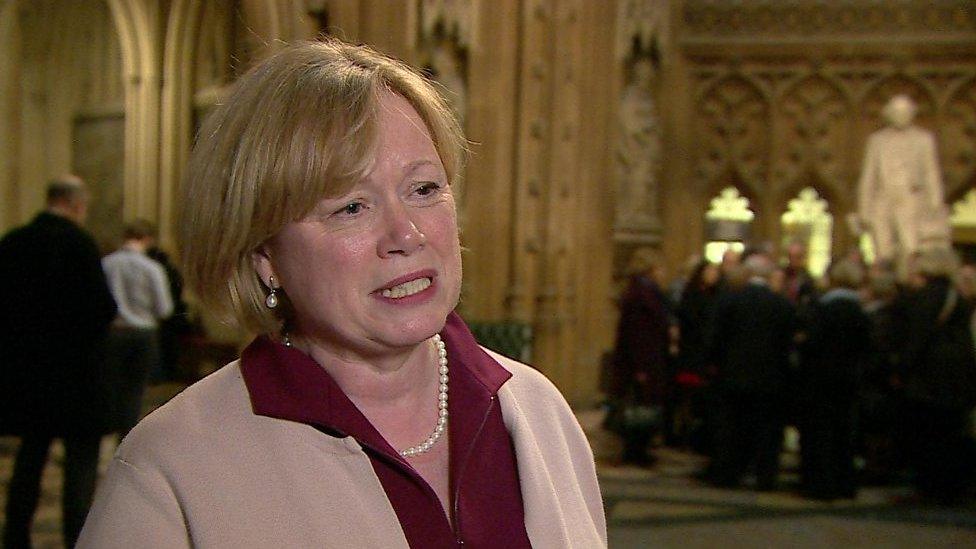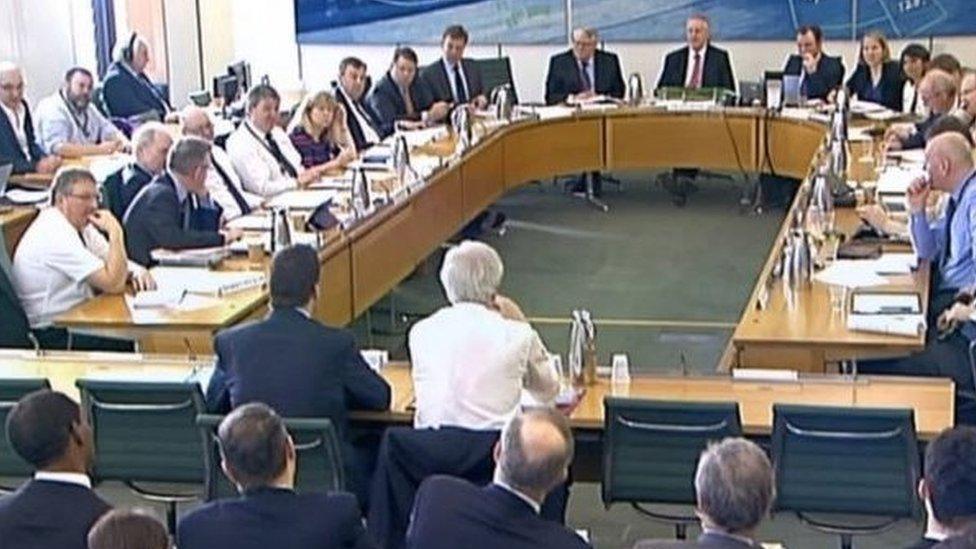Week ahead in Parliament
- Published
- comments

This week should provide a frisson for Maastricht veterans as the Commons gears up for a long attritional debate on the EU (Withdrawal) Bill, with Monday's conclusion of the second reading stage merely providing the prologue for a gruelling committee stage.
But MPs will at least have their select committees to provide light relief.
The formal motions to establish the committees should be approved on Monday - which will allow the committees to swing into action on Tuesday. Some are already scheduled to hold hearings; almost all will be holding planning meetings to agree new inquiries. So expect a flurry of announcements of new committee schemes.
Watch out, too. for what promises to be a nasty procedural spat over the balance of power on Public Bill and Delegated Legislation Committees - if the government succeeds in guaranteeing itself a majority on those, expect the Opposition parties to find ways to retaliate.
Here's my rundown of the week ahead:
Monday
The Commons opens (2.30 pm) with an hour of Education Questions. Any post weekend urgent questions or ministerial statements will normally follow at 3.30pm, but it may be that, unusually, the mood among MPs will favour moving straight on to the main business, the conclusion of the two-day second reading debate on the European Union (Withdrawal) Bill, external.

The justice secretary will be winding up the debate
There's talk that the sitting may be extended beyond 10pm to accommodate the number of MPs who want to speak, with voting beginning at midnight after wind-up speeches from Labour's Matthew Pennycook and the Justice Secretary (and former Europe Minister) David Lidington.
The witching hour will see several votes - not only the vote on the bill itself, but also on the programme motion setting out the structure for an eight-day committee stage. Labour are not supporting it, and want more time and that makes the Commons numbers dangerously tight for the government, because there may be enough Conservative rebels to defeat it.
If the motion is defeated, the government may try again later, or risk an open ended committee process.
Watch out too for votes that are normally formalities - on the Money Resolution, which authorises expenditure for the purposes of the bill, and the Ways and Means Resolution which authorises taxes for the purposes of the bill.
Both, critics say, are unusually widely drawn, since the bill is designed to provide the powers needed to enact a deal which has not yet been finalised - but that may well open an extra line of attack for the Opposition. In total there may be four divisions at the end of proceedings, extending into the small hours.
When the votes are done, keep an eye on the video feed from the chamber as assorted parties and groups of backbenchers rush to the table to put down amendments - the ones who get their first gain a measure of priority for committee stage debate, and there might even be a bit of jostling and argy-bargy as the different factions vie for pole position.
In the Lords (2.30 pm) questions to ministers cover the 6.1% interest rate on student loan debt from September 2017 and the impact of Brexit on opportunities for young UK citizens to travel, work and study within Europe.
The day's main legislating is the third day of detailed committee stage scrutiny of the Financial Guidance and Claims Bill , and there is a motion to regret the Non-Domestic Rating (Alteration of Lists and Appeals) (England) (Amendment) Regulations 2017, external and the Valuation Tribunal for England (Council Tax and Rating Appeals) (Procedure) (Amendment) Regulations 2017, external - from the crossbench peer, the Earl of Lytton.
Tuesday
The Commons starts (11.30am) with Business, Energy and Industrial Strategy Questions, and any ministerial statements or urgent questions will follow at 12.30pm.
Then a couple of internal issues follow. The Conservative awkward squaddie, Peter Bone, revives a cause dating back to the Wright Committee Reforms, external proposed in 2009 - with a ten minute rule bill for the creation of a Business of the House Commission.
This would take control of the Commons agenda away from the behind the scenes deal making of the so-called "usual channels" and hand it to a new body, who would then propose a draft agenda every week, for MPs to vote on and perhaps amend.
The proposal was first supported, then quietly dropped, under the coalition. I'm told other authoritative voices may also rally to this reform in the near future....
Expect a major row over a motion on House business designed to guarantee the government a majority on the Public Bill Committees, (sometimes referred to by their old title of Standing Committees), which do line-by-line scrutiny of bills and the Delegated Legislation Committees which examine statutory instruments (see previous story).
The day's main legislating is the second reading of the Finance Bill - which picks up budget measures postponed because of the snap election. These cover such subjects as making tax digital, personal service companies, and general rules against tax avoidance.
In Westminster Hall, debates include foreign direct investment into the UK. (9.30am-11am) and negotiations on the future rights of UK nationals in the EU (2.30pm- 4pm).
The Conservative new-arrival, Paul Masterton, leads a debate (4.30pm - 5.30 pm) on bereavement leave for families who lose a child - this was inspired by the All Party Parliamentary Group for Children Who Need Palliative Care, which he is a member of. With the government supporting a private member's bill, the debate will highlight the issues around bereavement support, and also link in with Child Loss Awareness Week, running 9 to 15 October.
Mr Masterton says parents in this tragic situation need reassurance that their jobs and pay will be protected and he will be asking the government to confirm its continued commitment to paid bereavement leave.

Labour leader Baroness Smith will criticise the government for lack of progress on Brexit
In the Lords (2.30pm) questions range across safe and secure accommodation for victims of domestic violence, ensuring mental and physical health conditions are treated equally in the health insurance and the government's review of gaming machines and social responsibility measures.
The day's main debate will be Brexit-focused, covering the government position papers and future partnership papers on the UK's future relationship with the EU - to which is added a Labour motion from their leader Baroness Smith of Basildon which criticises a "lack of progress" towards agreement on the UK's withdrawal terms and calls on the government to lay a statement of the strategy and principles which underpin their negotiations on withdrawal before both Houses of Parliament.
It also calls on the government to seek comprehensive interim arrangements with the EU, to maintain UK participation in the single market, the customs union, and security frameworks while a new long-term UK-EU relationship is to negotiated.
There's some action at last on the committee corridor.
Culture, Media and Sport continue its pre-election hearings on FIFA, with Professor Miguel Poiares Maduro, former chair of the FIFA Governance Committee and its independent review committee (4pm).
The Lords committee system swung into action much earlier than the Commons and their Economic Affairs Committee, external has a promising-looking session with the Chancellor of the Exchequer, Philip Hammond, his first select committee appearance since the election.
The committee is expected to ask about the state of the economy, Brexit and transitional arrangements, post-Brexit immigration policy, international students and the net migration target, and Hinkley Point C.
Wednesday
The Commons opens (11.30am) with Northern Ireland Questions, followed, at noon by Prime Minister's Questions. The day's main business will be a Labour Opposition Day Debate on a subject to be announced.
In Westminster Hall, new Labour MP Bambos Charalambous leads a debate on the waiting time standard for autism diagnosis (9.30am-11 am). He says research suggests children with autism are waiting over three and a half years for a diagnosis, despite NICE guidance that no one should wait more than three months. This means children are often left without access to support at school and many are then vulnerable to developing serious but avoidable mental health problems.
The Conservative Mims Davies has a debate on barriers for women in standing for Parliament (2.30 pm-4pm).

Committees will be up and running next week
The Public Accounts Committee is back in action (2.30pm) continuing its theme of investigating tax collection with an inquiry into overseas sellers failing to charge VAT on online sales with witnesses from Amazon, and eBay; and an official from HM Revenue and Customs.
In the Lords (3pm) ministers face questions on timetable for Brexit negotiations, the breeding of dogs and cats and unaccompanied child refugees
Then peers continue their detailed scrutiny of the Financial Guidance and Claims Bill.
It looks like a vote will be forced by the Lib Dem peer Lord Marks on a regret motion against the Civil Procedure (Amendment) Rules 2017, external - the issue is that the regulations appear to undermine protection against excessive legal costs in environmental lawsuits.
An international agreement, the Aarhus Convention, protects people and organisations who bring environmental lawsuits from being saddled with heavy legal bills if they lose, and Lord Marks is concerned that the new regulations allow that limitation to be lifted during a case. That, he says, could mean the threat of huge bills could again become a deterrent. The government has already lost a vote on a regret motion since the election.
Thursday
The Commons opens (9.30am) with Digital, Culture, Media and Sport Questions, followed at 10.10am by questions to the government's lawyer, the Attorney General.
The main (scheduled) event is a general debate on abuse and intimidation of candidates and the public during the general election campaign - expect some harrowing stories from all sides.
The final event is an adjournment debate on support for witnesses of terror attacks overseas, led by the SNP Chief Whip, Patrick Grady. He has constituents who were caught up in the Tunisia and Stockholm attacks, and wants to raise various issues about consular assistance and support for witnesses, even if not bereaved or injured.
In the Lords (11am) the first business is the introduction of the Lord Bishop of Lincoln, the Rt Revd Christopher Lowson.
Question time ranges across trade with Northern Cyprus , the Housing White Paper and public awareness of sepsis.
The remainder of the day is devoted to debates chosen by backbench peers, first on the effect of gambling advertisements on children and then on the impact of the English Baccalaureate on the take-up of creative and technical subjects.
Neither House sits on Friday - and Parliament will be in recess for the party conference season, returning on 9 October.